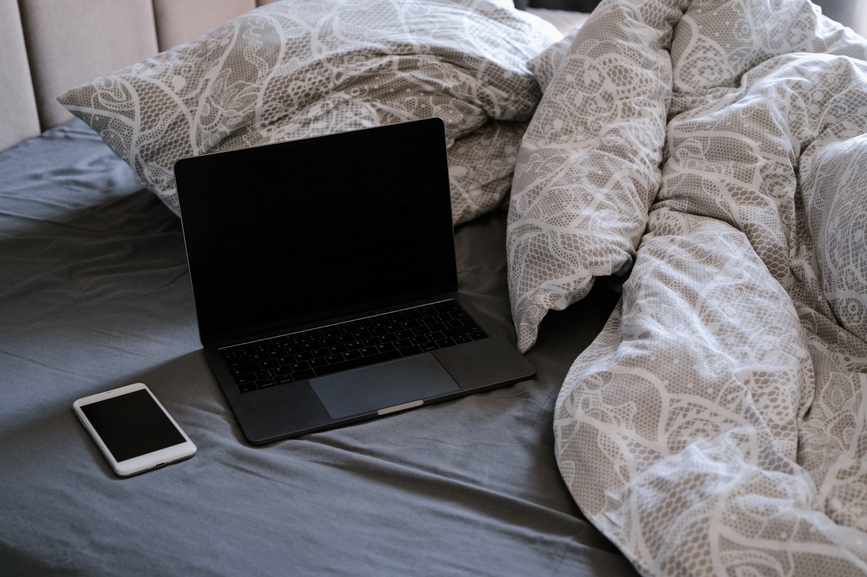Written by Ashley Kane,
Brightside Health
5 Minute Read

Medically reviewed by:
Mimi Winsberg, MD
Chief Medical Officer
10 Minute Read

You may be wondering if there is a connection between pornography and depression. While there have been many studies on the topic, the overwhelming consensus is that no, pornography itself does not cause depression and likewise, depression does not directly cause pornography use.
That said, there are links between pornography and depression—this article will explore and assess how they are related.
Signs and symptoms of depression
Now that we know pornography doesn’t cause depression, it’s worth considering what depression is.
Depression is a mood disorder that affects over 21 million Americans. There are multiple forms of depression, including:
- Major depressive disorder
- Persistent depressive disorder
- Seasonal affective disorder (SAD)
- Postpartum depression
- Premenstrual dysphoric disorder (PMDD)
People experience depression in different ways. Some may feel sadness or experience sleeping issues—others might feel burnt out or stressed most of the time.
The main symptoms of depression are:
- Having little interest or pleasure in doing things
- Feeling down, depressed, or hopeless
- Feeling tired or having little energy
- Poor appetite or overeating
- Feeling bad about yourself or feeling like a failure
- Trouble concentrating on things
- Moving or speaking so slowly that other people could have noticed, or being fidgety/restless
- Thoughts that you would be better off dead, or thoughts of hurting yourself
If you’re experiencing any of these symptoms, know that depression is highly treatable—it is estimated that 80% of people who engage in treatment get better.
How pornography and depression relate
While studies have consistently observed an association between pornography use and depression symptoms, data limitations have historically prevented concrete conclusions. Here’s what we know, and what the research suggests.
Pornography use varies based on one’s perception of it and personal attributes such as age, gender, personality, life experiences, religion, culture, and societal norms. The consumption of pornography is widespread among adults, with 70-90% of people having viewed pornography in their lifetime, often without any negative effects.
However, one study highlights the difference between young adults’ perception of pornography versus their usage: 67% of young men and 49% of young women agree that viewing pornography is acceptable, whereas 87% of young men and 31% of young women reported using pornography.
This imbalance between what one views as acceptable and their actions may be key to understanding the link between pornography and depression. As one study published in 2018 demonstrated, “Results also suggested that individual differences between perception and use were significantly related to depression.”
Additional research further explored the idea that it is not the pornography itself, but one’s feelings about it that are linked to depression:
The connection between pornography use and depressive symptoms hinges on the (1) (in)congruence between Americans’ moral beliefs about pornography and their viewing practices and (2) gender. Cross-sectional and longitudinal analyses reveal that American men (not women) who believe viewing pornography is always immoral but watch it anyway are more likely to experience depressive symptoms compared to others who do not report this incongruence.
This means that men may be more likely to experience depression as a result of pornography if they believe it is morally wrong. It’s important to note, however, that the depression symptoms were mild and infrequent.
You may be wondering, if this is how depression and pornography are linked, what does that mean for men who do not consider pornography to be immoral? The study continues:
For those who do not morally reject porn, however, only viewing it at the highest frequencies is associated with higher levels of depressive symptoms, which suggests reverse causation—depressed men likely view higher levels of pornography as a coping aid, especially when they do not view it as immoral.
As noted above, it is possible that some people dealing with depression may view higher levels of pornography as a way to cope, though research is inconclusive at this time.
High usage of pornography may be cause for concern
As the previous study noted, high usage of pornography was associated with higher levels of depression symptoms. So, what are some of the signs to look out for?
Frequent viewing of pornography could be a sign of addictive behavior, compulsion, or sexual addiction.
Signs of when pornography usage may be cause for concern include:
- If you experience higher levels of hypersexuality
- If you isolate yourself from activities you once enjoyed
- If the amount of time viewing pornography negatively affects other aspects of your life, such as work, home, school, or relationships
- If you have difficulty resisting it, feel guilty or distressed because of watching pornography
- If you begin objectifying others or start taking high-risk behaviors
If you or someone you know is spending an unhealthy amount of time viewing pornography, it is a good idea to reach out to a mental health professional for support.
In conclusion
While there is still much research needed on the relationship between pornography and depression, current research suggests that the two are linked in terms of when there is an imbalance between one’s feelings about pornography and their actions.
If you are experiencing depression, or if viewing pornography leads to increased symptoms of depression for you, know that support is available.
Brightside Health treats depression with personalized therapy, medication, or both. If you would like to get started with quality mental health care, you’re in the right place.













